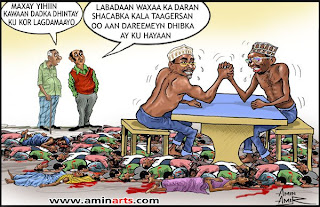26 May 2011 – The Security Council has stressed that a planned consultative meeting of Somalia’s leadership next month should result in agreement on a schedule for elections in the Horn of Africa country, where the interim federal institutions remain divided over governance issues beyond August when the transitional period expires.
“The international community expects that at that their meeting there should be agreement on the timing of elections, roadmap and benchmarks for the way forward in the political process in Somalia,” said Ambassador Mark Lyall Grant of the United Kingdom at a news conference yesterday in the Kenyan capital, Nairobi, where members of the Security Council focused on the situation in Somalia.
The consultative meeting is slated to take place in Mogadishu, the Somalia capital, between 11 and 16 June.
Nairobi was the last stop on a trip to Africa that took the Council members to the Ethiopian capital, Addis Ababa, for discussions with Africa Union officials, and to Sudan, where they visited the capital, Khartoum, as well as Juba, the capital of Southern Sudan.
Political divisions between Somalia’s Transitional Federal Government (TFG) and interim Parliament have undermined the momentum of the country’s peace process, Augustine Mahiga, the Special Representative of the Secretary-General for Somalia, told the UN News Centre in an interview earlier this month.
The Parliament voted in February to extend its term for three years after the end of the transitional period, a move rejected by the TFG, which has instead proposed extending the interim period for one year, saying it wanted to try to enhance political stability and security.
 Mr. Lyall Grant said the Council, which met with Somalia’s president, prime minister and speaker of parliament in Nairobi, had demanded that they “should stop the infighting and unilateral extensions of their respective mandates.”
Mr. Lyall Grant said the Council, which met with Somalia’s president, prime minister and speaker of parliament in Nairobi, had demanded that they “should stop the infighting and unilateral extensions of their respective mandates.”
Secondly, they should focus on key transitional tasks to which they previously had been committed – outreach, reconciliation, the draft constitution, governance and financial accountability, he stated.
“And thirdly they should engage immediately and constructively with SRSG Mahiga who has the full support of the UN Secretary-General and the whole of the Security Council in the consultative process he is facilitating,” Mr. Lyall Grant added.
Members of the Council also expressed their full support for the work of the AU peacekeeping mission in Somalia (AMISOM), and paid tribute to Ugandan and Burundian troops for their efforts to improve security for Somalis in Mogadishu.
They also stressed the need to strengthen the Somali security forces, and called for a comprehensive and collaborative campaign against maritime piracy off the coast of Somalia. Women must also participate in the peace process, they added.
The consultative meeting is slated to take place in Mogadishu, the Somalia capital, between 11 and 16 June.
Nairobi was the last stop on a trip to Africa that took the Council members to the Ethiopian capital, Addis Ababa, for discussions with Africa Union officials, and to Sudan, where they visited the capital, Khartoum, as well as Juba, the capital of Southern Sudan.
Political divisions between Somalia’s Transitional Federal Government (TFG) and interim Parliament have undermined the momentum of the country’s peace process, Augustine Mahiga, the Special Representative of the Secretary-General for Somalia, told the UN News Centre in an interview earlier this month.
The Parliament voted in February to extend its term for three years after the end of the transitional period, a move rejected by the TFG, which has instead proposed extending the interim period for one year, saying it wanted to try to enhance political stability and security.
 Mr. Lyall Grant said the Council, which met with Somalia’s president, prime minister and speaker of parliament in Nairobi, had demanded that they “should stop the infighting and unilateral extensions of their respective mandates.”
Mr. Lyall Grant said the Council, which met with Somalia’s president, prime minister and speaker of parliament in Nairobi, had demanded that they “should stop the infighting and unilateral extensions of their respective mandates.”Secondly, they should focus on key transitional tasks to which they previously had been committed – outreach, reconciliation, the draft constitution, governance and financial accountability, he stated.
“And thirdly they should engage immediately and constructively with SRSG Mahiga who has the full support of the UN Secretary-General and the whole of the Security Council in the consultative process he is facilitating,” Mr. Lyall Grant added.
Members of the Council also expressed their full support for the work of the AU peacekeeping mission in Somalia (AMISOM), and paid tribute to Ugandan and Burundian troops for their efforts to improve security for Somalis in Mogadishu.
They also stressed the need to strengthen the Somali security forces, and called for a comprehensive and collaborative campaign against maritime piracy off the coast of Somalia. Women must also participate in the peace process, they added.





.jpg)












No comments:
Post a Comment